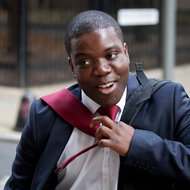 Simon Dawson/Bloomberg NewsKweku M. Adoboli, a former UBS trader, is charged with fraud and false accounting in connection with a $2.3 billion loss.
Simon Dawson/Bloomberg NewsKweku M. Adoboli, a former UBS trader, is charged with fraud and false accounting in connection with a $2.3 billion loss.
LONDON — UBS will face the harsh glare of the spotlight again on Friday, as opening arguments begin in the trial of a former trader accused of hiding a multibillion-dollar loss at the investment bank.
Kweku M. Adoboli, 32, the former trader, faces charges of false accounting and fraud in connection with a $2.3 billion loss at the bank. He has pleaded not guilty.
“As uncomfortable as the entire trial will be for UBS, it will show us what the consequences are when misconduct occurs or when individuals do not take their responsibilities seriously,” the bank’s chief executive, Sergio P. Ermotti, said in an internal memo made public by the firm.
UBS, which has struggled to regain its footing since the financial crisis, has been plagued by a number of scandals in recent years.
In 2009, the investment bank, based in Switzerland, agreed to pay $780 million to settle a tax fraud case with American authorities. Three former UBS executives were convicted earlier this year for rigging bids in the municipal bond market.
The bank has also been ensnared by a global investigation into rate manipulation. UBS, which is one of more than a dozen institutions under investigation, struck an immunity deal with authorities.
The case against Mr. Adoboli has only added to the questions about the bank’s oversight and risk management.
After the financial crisis, UBS, which had been hobbled by bad real estate bets, vowed to overhaul its internal controls. But the bank disclosed two years later that it had “discovered unauthorized speculative trading,” and Mr. Adoboli was arrested. According to the charges, his activities spanned more than three years, starting in 2008.
UBS subsequently conducted an internal investigation into the loss. The review showed that the firm’s risk controls had raised red flags about unusual trading activity, but that managers had failed to adequately follow up. “We have to be straight with ourselves,” Mr. Ermotti, the chief executive, said in 2011. “In no circumstances should something like this ever occur.”
The UBS trading scandal echoes past cases.
In 2010, Jérôme Kerviel, a trader at the Paris-based bank Société Générale, was convicted of generating more than $6 billion in losses. He is appealing the matter. Another trader, Nicholas W. Leeson of Barings Bank, racked up $1 billion in losses, prompting the failure of the British institution in 1995. Mr. Leeson pleaded guilty and served four years in prison.
Mr. Adoboli started his finance career at UBS. He joined the bank as an investment adviser trainee in London shortly after graduating from Nottingham University in 2003, and eventually worked his way up to the Delta One desk, a plain-vanilla version of derivatives trading. Traders in this group create investments that track specific financial assets like a basket of company stocks.
Mr. Adoboli fired his lawyers at Kingsley Napley, the firm that had previously represented Mr. Leeson. Mr. Adoboli is now represented by Bark Company, another law firm in London.
If convicted, he could face up to 10 years in prison. The trial is expected to last up to eight weeks. Both current and former UBS employees could be called as witnesses, though the firm has not been accused of any wrongdoing.
Legal restrictions in Britain limit the information that can be reported about the case to avoid biasing the proceedings. UBS and a lawyer for Mr. Adoboli declined to comment.
When the trading scandal erupted last year, it reverberated through the upper ranks of UBS. The chief executive, Oswald J. Grübel, whom UBS had recruited to oversee its turnaround, promptly resigned. The co-chiefs of global equities, the division where the loss occurred, also left the firm.
The firm’s profit also suffered. After disclosing the trading losses, UBS reported that quarterly earnings dropped 39 percent to $1.2 billion.
The blowup has worsened the bank’s financial woes. Like other European banks, UBS is dealing with the sluggish economy and the sovereign debt crisis in Europe.
With investment banking operations slumping, institutions have moved swiftly to lay off staff and revamp their strategies. UBS has announced 3,500 job cuts, with about half expected in the investment banking division. It has also shifted its focus toward wealth management.
“The banks are slowly realizing there are parts of their businesses that just don’t make money,” said Pete Hahn, a fellow at Cass Business School in London. “A fundamental rethink is under way.”
Article source: http://dealbook.nytimes.com/2012/09/13/trial-to-begin-for-former-ubs-trader-accused-of-hiding-huge-loss/?partner=rss&emc=rss